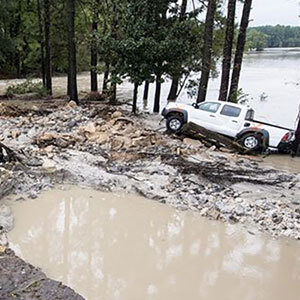
Northeast Tri County Health District Urges Individuals to Take Steps to Stay Healthy and Safe Before, During and After Flooding
With showers and wet thunderstorms expected in Central and Eastern Washington state into Friday, National Weather Service officials issued a flood warning, cautioning that rivers in these areas are likely to flood or continue flooding.
Since floods can impact the public’s health, sometimes even leading to loss of life, Northeast Tri County Health District (NETCHD) officials urge individuals in Stevens, Pend Oreille and Ferry counties to take steps to stay healthy and safe.
Before Flooding Happens
Make a flood emergency plan with plans for evacuation, shelter, and locations for high ground.
Build or restock your emergency preparedness kit. Include a flashlight, batteries, cash, and first aid supplies. Make plans to severely limit water use during and after flooding.
If you have a drinking water well, make sure it has a tight-fitting, waterproof cap. Wrap the cap and well casing with durable sheet plastic and duct tape, then place sand bags around the well. Ensure the backflow prevention valves are in place. Turn the electricity off to your well pump just prior to the flood. Do not turn the electricity back on until the flood waters recede. If the well is not used during the flood, plug the vent holes. Remember to unplug the vent holes after threat of flood is passed.
If you have a septic system, ensure all access points to the system (lids, risers, cleanouts and inspection ports) are properly covered to prevent the flow of flood waters into the system. Install a backflow preventer (check valve) on the building sewer so sewage cannot back up into your home during a flooding event. If your septic system requires electricity, turn off the pump and alarms at the circuit box before the area floods. Discontinue use of the system once the power supply has been shut off. Limit water use during and after the actual flooding event. The drain field may not accept effluent until the area dries. Normal water use should not continue until the area is unsaturated and the septic system has been inspected to identify problems and any necessary repairs have been made.
Bring in outdoor furniture and move important indoor items to the highest possible floor. This will help protect them from flood damage.
Disconnect electrical appliances and do not touch electrical equipment if you are wet or standing in water. You could be electrocuted.
If instructed, turn off your gas and electricity at the main switch or valve. This helps prevent fires and explosions.
To avoid being trapped when floodwaters threaten know and follow the directions from local officials for community evacuation. Do not enter flooded areas or moving water, either on foot or in a vehicle, including areas that appear to have only inches of water.
Floods can also cause damage to structures, land, roads and utilities, and can also lead to erosion and landslides, and result in secondary damage. Earlier this week, Gov. Jay Inslee proclaimed a state of emergency for Eastern Washington counties, confirming that flooding is already impacting regional water and sewage treatment facilities and threatening state highways and local roads. While state agencies and local jurisdictions are coordinating resources to address the impacts caused by the flooding, there are steps individuals can take as well.
After a Flood
Return home only when authorities say it is safe.
Be aware of areas where floodwaters have receded and watch out for debris. Floodwaters often erode roads and walkways.
Do not attempt to drive through areas that are still flooded.
Avoid standing water as it may be electrically charged from underground or downed power lines. If there is standing water in your home, never turn power on or off yourself – contact an electrician.
Photograph damage to your property for insurance purposes.
It is best to assume that all floodwater is contaminated with disease-causing organisms, such as bacteria and viruses.
Important health considerations
Wear waterproof boots and gloves to help avoid skin contact with floodwater, wash hands often, be current on your tetanus vaccination, and protect open wounds from floodwater.
Clean and dry out your home to disinfect and prevent mold growth. In most cases, household cleaning products will be adequate for cleaning. Items that cannot be washed and disinfected may have to be discarded. Remove as much moisture as possible quickly to help control mold growth.
Eat and drink only food and water that are safe.
Check for boil-water advisories.
Do not use contaminated water to wash dishes, brush teeth, prepare food, make ice or make baby formula.
Wells that have been flooded should be disinfected and tested before being used for drinking water. NETCHD has specific guidance on the process to disinfect a drinking water well that can be obtained at any of our offices or at www.netchd.org
Evaluate flooded septic systems. Don’t put the system back in use until after the flood waters recede and an evaluation of the system is made. NETCHD has specific guidance about septic systems impacted by floods that can be obtained at any of our offices or at www.netchd.org.
“These floods continue to leave devastation behind them, and we understand that people will want to clean up and repair their homes and communities as soon as possible. We’re here to help protect their health as they do so,” stated Matt Schanz, NETCHD Administrator.
More information is available at any NETCHD office or on its website at www.netchd.org . Staff are also available to assist in providing recommendations and consultation. Upon request, staff are available to visit properties after floodwaters recede to assist homeowners in recovery recommendations.
NETCHD Offices:
• Colville – Stevens County: 509-684-2262
• Newport – Pend Oreille County: 509-447-3131
• Republic – Ferry County: 509-775-3111

